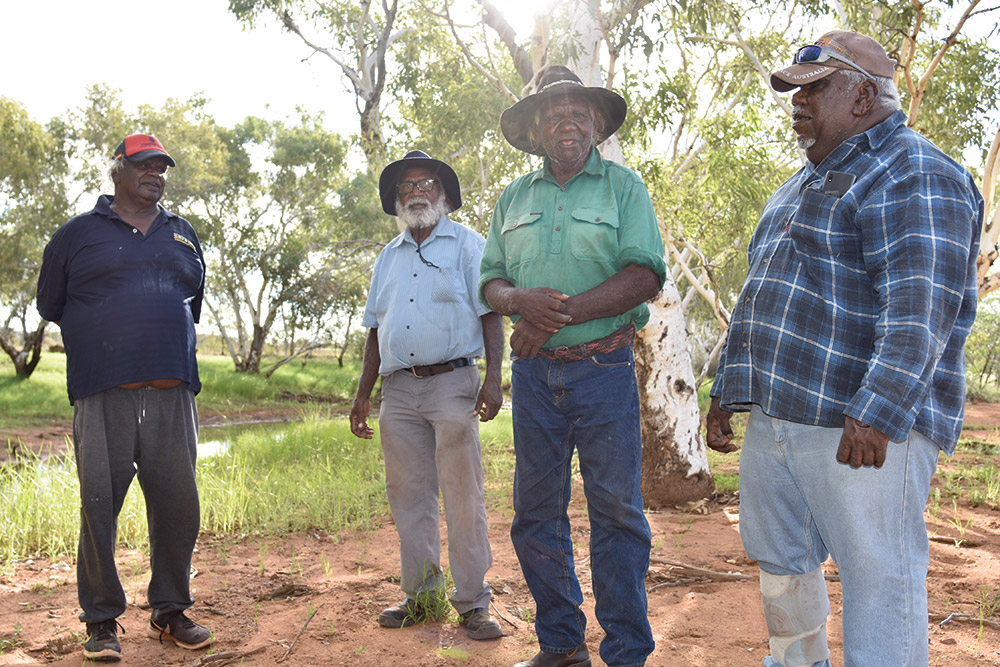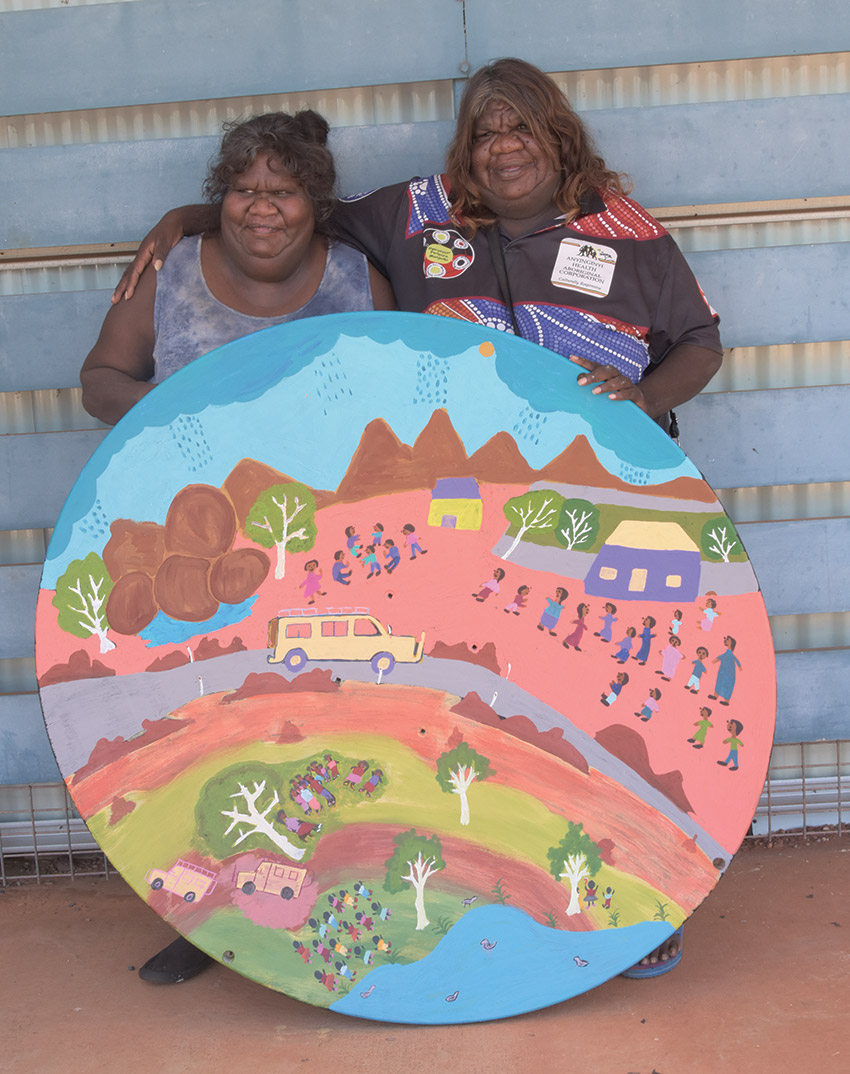
Native title holders and community residents have asked the Central Land Council to fight a water licence decision on Singleton Station if it is approved unchanged. Fortune Agribusiness has applied to pump up more than 40 billion litres of water annually, for 30 years, to grow fruit and vegetables on the pastoral lease south of Tennant Creek.
If the government grants the controversial application, the company would be able to take, free of charge, every 12 months more than four times as much drinking water as Alice Springs uses in a year.
It would be the largest private water allocation in the Territory’s history and would irrigate one of Australia’s biggest horticulture projects.
Native title holder Roger Tommy said the company is asking for too much. “We don’t want them to take all that water, we may have no water left for our communities,” he said. “They can have two bores, but no more than that. If you got a big mob of bore, you’re using up too much water.”
Senior knowledge holder Donald Thompson, who grew up in the region and worked around Singleton, said the proposal may be too risky.
“We’re worried that the country will dry out, and with no water there’ll be losses of all the animals and wildlife,” he said. “That’s why we’re talking really strongly to the government about this proposal.”
Traditional owners, residents, businesses and scientists are concerned that too little is known about how the company’s plan would affect native plants, animals, sacred sites and community drinking water in years to come.
A big meeting of native title holders and affected residents in Tennant Creek in February said independent water scientists must be allowed to check the licence, its conditions, the company’s ‘adaptive management framework’ and the way the government plans to manage the licence – a process known as ‘peer review’.
If that review shows it is too unsustainable and risky the meeting wants the CLC to fight the decision.
“We’re worried about the water levels dropping and we want to consult with people who know how much water there really is,” Mr Thompson said. “We got to know how much [water] is in the ground because that’s an important resource that could be lost. That knowledge should inform the decision. The government should find it out first, before they start making big project decisions.”
Elder Michael Jones implored the meeting to think about future generations. “Twenty to 40 years down the track – will the traditional owners have enough water?” he asked.
“Our kids got to survive, and the animals. They need to do more testing about how long that water is going to last.”
Independent water scientist Dr Ryan Vogwill has reviewed the Northern Territory Government’s water planning on which the Fortune Agribusiness application is based. He warned the meeting that the planning is “high risk” because it is based on too little information.
Dr Vogwill said the planning ignores the most culturally and ecologically important places, such as wetlands, springs and soaks, an oversight he called a “major gap”.
“There are more gaps than there are areas with a high level of understanding”, he said.
Water expert Dr Dylan Irvine, from Charles Darwin University, has also criticised the lack of data. “There’s modelling from Fortune Agribusiness. The issue with that model is it’s based on scant data, and we don’t know what the impact on salinity is going to be in the shallow aquifer region,” he said.
Dr Vogwill found there were “high levels of uncertainty” about the modelling and about how plants and animals would be affected. He wrote “the Murray-Darling is a good example of what happens” when lots of water is taken out of a system before we know what will happen down the track.
Tim Bond, a senior government water planner, told the meeting “we know enough about what’s likely to happen. We have put together a model based on our best estimate”. He said more research and monitoring would happen after a licence decision.
The government plans to practice ‘adaptive management’, saying it could cut back the water allocation if there turns out to be less water than it thinks.
The company would “get a little bit of water and if all goes well they get a bit more”, Mr Bond said.
“Adaptive management means that you are reacting to a problem when it has already happened,” executive member Michael Liddle countered. “There’s too many unknowns to take this risk.”
“You can’t give us a straight answer and we’re not happy with the whole process,” he said.
The process “is fraught with risk that may result in undesirable impacts on the environment or big reductions in allocations that may have serious project feasibility or negative economic outcomes,” according to Dr Vogwill.
No wonder small Aboriginal-owned horticulture pilot projects around Singleton are feeling threatened.
Centrefarm applied on behalf of the Iliyarne Aboriginal Land Trust for a 1,000 megalitre water licence for a horticultural operation south of Wycliffe Well. The company also trains young people at its horticulture training centre near Alekarenge, with promising results.
It fears these projects could become unviable if all of the Singleton application is granted.
“Teenagers who have been disengaged from school have been attending to learn about horticulture and are growing, harvesting and selling their own veggies to the community,” Centrefarm’s Joe Clarke said.
“The project is giving these young people opportunities to work on country, but its future depends on nearby Aboriginal-owned projects having sustainable access to groundwater that could be threatened by the massive Singleton application.
“It would be a real shame if the allocation put our training centre and Iliyarne’s plans at risk. These young people are the future and they must be the priority,” he said.
Native title holder Heather Anderson struggled with the idea that horticulture companies would get the water for free from the NT Government. “Water is not for free, water belongs to the land. It should stay there,” she told the Guardian news site.
The ‘free’ water is worth a lot of money, and that attracts companies to the Territory. “If this water was being extracted from the Murray Darling Basin, we’d be talking in the order of $20 million a year for that water use,” Dr Irvine told the ABC.
Mr Liddle does not believe the government will ask the company to pull out fruit trees and irrigation lines later on, if its “guesswork” turns out to be wrong.

“No future government will have the political will to cut back the water allocations of companies that have already invested millions of dollars,” he said.
Nobody may find out if there are problems because the government trusts the company to do the monitoring.
Maureen O’Keefe grew up around Singleton, where her parents worked and met.
“We’re not worrying about money, we’re worrying about life,” she told the meeting.
“We have climate change and we don’t have rainfall every year. I’ve been crying for this country. All the springs will be dried out. Then we got no name for them anymore. All the cultural sites will suffer and we will have no stories to tell for our kids,” she said.
CLC chief executive Joe Martin-Jard is also concerned that the government’s planning does not take into account global heating. “We’re mining a very precious, finite fossil resource that is likely to dwindle even further due to climate change and more frequent droughts,” he said.
“It would be extraordinary if it made such a far reaching decision based on assumptions and guesswork.”
Environment groups said the application should be rejected because even small errors in the government’s modelling could cause irreversible problems.
“There is no guarantee of how or when those water resources and the communities and ecosystems that rely on them would recover,” Kirsty Howey, from Environment NT, told the Guardian.
“And we’re not sure that they would, in fact, ever recover. That means that extreme caution should be exercised.”
CLC executive member Michael Liddle agreed. “Our water is too precious to rush this or get it wrong.”
